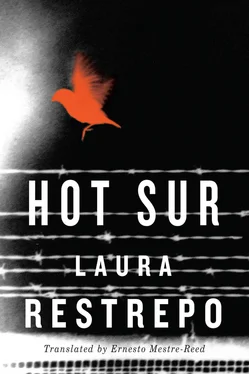One day you made me laugh in class and I always laugh again when I remember the episode. We had gone through several classes working on a story you had assigned and I just wanted to finish it, no matter what. But my story had too many characters and each of them had too many things happening to them, so there was no way.
“Read it, Mr. Rose,” I asked you, “and advise me on how to finish it.”
“I don’t know, María Paz, I really don’t know,” you said after you had read it. “This thing you’ve written is too tangled up.”
“Just dictate an ending to me,” I insisted, “because I can’t take it anymore.”
“Alright, I’m going to give the advice that my friend Xavier Velasco offers for such cases. You have a pencil? Then write: ‘And everyone died.’”
So I was telling you about how I wanted to complain to Jordan Hess. But how would I get in touch with him if I didn’t know him and didn’t have his phone number or e-mail address? When it came down to it, all I had were the words that he had written. No matter how many questions I asked him he was never going to respond, and that was as disappointing as praying to God. The real miracle was you, Mr. Rose. A women’s state prison is the last place in the world you’d expect to find a writer. That’s why I’m giving you this story that I wrote for you. So you revise it if you like it, and publish it under your name if you think it’s good enough. Or at least that you read it, just that you have read it will make me happy. Pretend that it is one of the exercises that you assigned for class, just somewhat longer than usual.
And now, let me tell you a little bit about my sister, Violeta. Pretty and strange, given her appearance. Different. Sometimes unbearable and sometimes likeable, shy at times and at times wild. I was almost a teenager and she was a little girl when we were finally able to meet, or I should say meet again, on the plane to America. Five years before, my mother, Bolivia, had left for America to fulfill her dream and to make some money, because there wasn’t enough to support us. She wanted us to have a good life, that’s what she said, and the good life was only over there, in America. Or I should say here , but, back then, for us America was very distant and unreachable. Violeta was my only sister, she with one last name and me with another, but both of us with map names, like all the females in our family. It was on that plane that I began to know my sister. I had met her just a few hours before, at the airport, and she clutched her stuffed giraffe as if her life depended on it. But she didn’t want to hug me, not even to turn around and look at me, although her godmother told her, “Go on, say hi; it’s your sister, María Paz.” But she seemed to need nothing but that giraffe and wasn’t paying attention when I showed her the chain around my neck.
“Look, Violeta,” I said, gesturing for her to look at it, “you’re wearing the same one.” I reached out my hand to grab her chain, that was all I did, tried to touch the chain to show her it was like mine, and that’s when she, who up to that moment had seemed angelical and lost in thought, turned into a lightning bolt and scratched my cheek. You should have seen it; she drew blood with her nails, like a cat with rabies. I found out then, that’s what my little sister was, a pretty cat who was almost always indifferent, but could turn fierce in a flash.
That was our first encounter after waiting five years for a reunion. Bolivia had not been able to take us with her to the United States because she had gone there tempting fate as an undocumented worker, leaving us with the promise that in a few months she’d send for us, as soon as she had a visa, a place to live, and a job. Some of the girls in my school, back in our native country, would go out to flaunt their stuff in tight Lycra pants, Nike shoes, and Bebe brand shirts with brilliant hearts and silver sequins. There was no need to ask where such treasures came from. “This is American,” they said, “they brought it to me from Miami.” I didn’t have anyone who could bring me anything from Miami, not even Barbies. On the other hand, we knew that Bolivia was there and that one day she’d bring us there, me and my sister, and she’d fill our closets with American clothes. Sometimes, I saved enough money to buy a Milky Way. They sold them as contraband near the school exit and I’d taste them with my eyes closed, not daring to actually ever bite into one, thinking, this is what America tastes like, and the first thing I’m going to do when I get there is to go on a Milky Way binge. I’m going to buy a whole bag of the minis just for myself, my favorite, because I could stick the whole thing in my mouth and dream about my mother in America.
Bolivia had left Violeta and me in different houses, cared for by different families in separate cities. She couldn’t find anyone to take both girls at once. As I’ve said, when she left I was seven and Violeta only a few months old. I was one man’s daughter, Violeta another man’s, and my mother had broken things off with both of them. Who were these men, what kind of creatures were they, what color were their eyes, their hair, were they good people or not? Only our mother knew. See how things are, I’ve never known anything about the man who gave me life, and now I don’t know much about you, who is going to write my biography. I know that once you hit a bear riding a motorcycle on a mountain road. I know it because you told the story in class. I’m trying to remember what your hands looked like. Big? White? That would be the obvious choice, but the truth is I don’t know. Maybe I’ve forgotten, or perhaps never really looked at them, although I doubt it, I like masculine hands and in Manninpox there weren’t many. Your face also has been erased, so I have given you Andre Agassi’s face. I hope that’s okay.
Oh, Bolivia, at what point did you become obsessed with America? The fact was that we too lived in America, Latin America. But that wasn’t America: the North had even taken the name. Bolivia would say on the phone, “Here the streets are safe, honey; the trucks pick up the garbage every day and there is no one without a car.” That’s what Bolivia said, and she assured me that America smelled clean and I believed her, and I dreamed of that smell, and of the taste of Milky Ways, and took it for a fact that Bolivia had a car. If everyone else did, why not my mom? She called every month religiously, once a month, and she sent money for our upkeep. She also called Violeta, although at first she was too young, but even when she was older, she never wanted to speak on the phone. She had her issues, Violeta, so pretty and so locked up in her silences. Unless she gets the urge to talk or scream, and then no one talks as much or screams as loud.
Once, when we were already in the States and Violeta must have been around thirteen, she started to scream in a museum where I had taken her one Sunday. All of a sudden she let out a prolonged shriek because of a portrait she had seen. Of a saint. I don’t remember the painter, but an old, dark canvas. There was something terrifying about it, for sure. It was St. Agatha and she was carrying her breasts on a platter, white, very round, and tender, one on each side of what seemed to be a silver platter. They had severed them to torture her and she exhibited them so that humanity took note of her unshakable faith. It was my fault; I shouldn’t have explained it to Violeta. She asked me, “What is that woman carrying on that plate?” And I told her the truth when I could have lied, I could have told her, It’s a pair of coconut pudding cakes. Of course, she’d have started to ask, Who are the pudding cakes for, why is she carrying them in that platter, why doesn’t she eat them? It’s always some story with no end with her: when something bothers her, she doesn’t stop asking questions. Sometimes it seems that she has finally forgotten a matter, and a month passes, two months, without her mentioning it, but not a chance. At some point out of nowhere she’d start again, And why was she carrying those pudding cakes? You don’t even remember what you had been talking about, but for her it’s as if the old conversation had never been interrupted: And why are they coconut, why doesn’t she eat them, and why two and not one? That’s how she is, Violeta. She’s either quiet for weeks on end, or she’s such a chatterbox asking endless questions that she drives even the sanest person mad. But now that I think about it, she who always asks so many questions never asked why they had cut St. Agatha’s breasts off. She just started to scream.
Читать дальше












